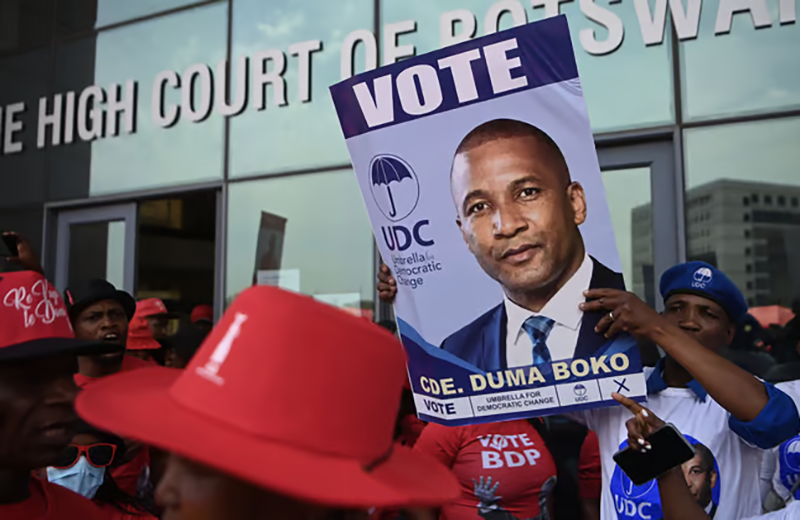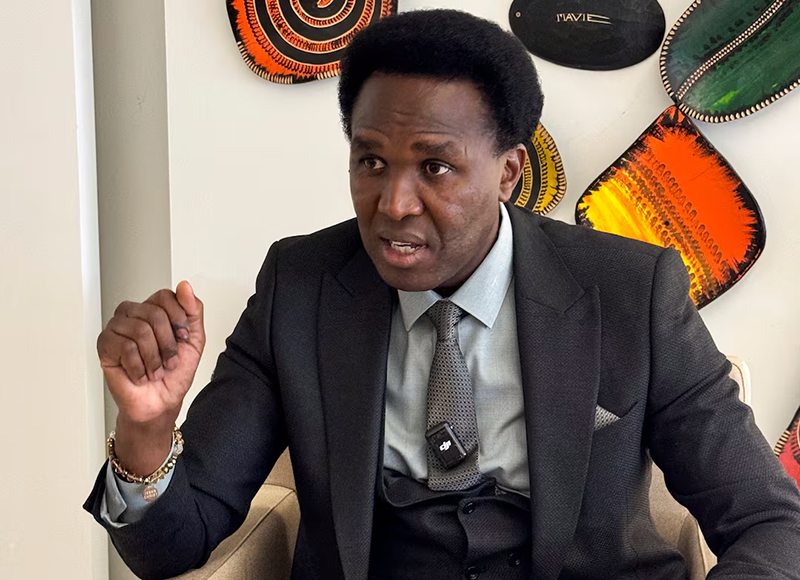- Featured
- No Comment
Zimbabwe accused of interfering in neighbours’ elections; Opposition in Botswana, Mozambique, Namibia blast Harare meddling

HARARE: Zimbabwe’s close ties with ruling parties in neighbouring countries is attracting controversy, with opposition movements in Botswana, Namibia and Mozambique accusing Zanu-PF of interfering in their local elections.
Zimbabwe’s ruling party is one of the remaining liberation movements in power in Southern Africa, and it claims to be battling neo-colonial forces allegedly trying to make a comeback in the region.
Zanu-PF deployed campaign teams to help the Front for the Liberation of Mozambique (Frelimo) and its new president Daniel Chapo ahead of the disputed October 9 elections. In fact, Frelimo was allowed to hold campaign rallies across Zimbabwe in the run-up to the polls, targeting the diaspora vote.
Some members of Zimbabwe’s ruling party also claimed to have voted for Frelimo, as they took advantage of Mozambique’s diaspora voting system.
Zimbabwe has a large population of Mozambicans who fled the country’s civil wars over the years. Many of them took part in the polls, as the diaspora constituency.
In Botswana, Zanu-PF officials have been campaigning alongside President Mokgweetsi Masisi’s ruling Botswana Democratic Party (BDP) ahead of the October 30 polls.
Namibia’s opposition this week staged protests against a South African company that was contracted to print ballot papers for the November 27 elections, which they say is linked to a close associate of Zimbabwe’s President Emmerson Mnangagwa.

Earlier this year, Zanu-PF hosted a conference of liberation parties in the Southern African Development Community (SADC) where it said it wanted to galvanise them to thwart threats from “erstwhile colonisers.”
The parties were South Africa’s African National Congress (ANC), Tanzania’s Chama Cha Mapinduzi, Frelimo, BDP, People’s Movement for the Liberation of Angola (MPLA) and Namibia’s South West Africa People’s Organisation (Swapo).
While the parties, except for the ANC, stayed away from Zimbabwe’s controversial August 2023 elections, Zanu-PF has been visible in Botswana, South Africa, Mozambique and Namibia.
Former Botswana president Ian Khama, who is campaigning for an opposition candidate challenging his successor, has been vocal about Zimbabwe’s alleged interference in the elections.
“We just learnt that members of Zanu-PF voted in the just ended Mozambique general elections,” Mr Khama told a recent campaign rally.
“Remember (President) Mnangagwa went on national television and promised to help (President) Masisi win elections. The ruling party is preparing to rig the general election by using Zimbabweans to vote here in Botswana. If Zimbabweans managed to cast their votes in Mozambique’s general election, they could do that to help the ruling party in Botswana.”
Job Sikhala, a Zimbabwean opposition leader, said SADC must stop Zanu-PF.
“Zanu-PF’s push for regional recognition has reached desperate levels,” Mr Sikhala said.
“They are arrogantly coming out in the open declaring that they are assisting in any way possible to make sure their friends in Botswana win the forthcoming elections. That’s interference in the domestic affairs of a sovereign neighbouring state. SADC can’t be silent.”

Nick Mangwana, Zimbabwe Government Spokesman, denied the allegations of interfering in elections in neighbouring countries.
“Zimbabwe works with any government democratically elected into office in the region,” Mr Mangwana said.
“As a country, we only participate in regional elections under the ambit of SADC observer (missions) or under the auspices of fraternal parties. We accept that we do provide thought leadership in the region and we have a lot of clout, but it is preposterous to allege that Zimbabwe is the country that determines who governs every country in the region.”
Last year, Zimbabwe accused Zambian President Hakainde Hichilema of trying to influence the August 2023 elections after a SADC observer mission dismissed the polls as not meeting regional standards.
President Hichilema had appointed former Zambian vice-president Nevers Mumba to lead the SADC observer mission.
Zimbabwe is now accused of trying to prop up former Zambian president Edgar Lungu to challenge the incumbent in 2026.
The diplomatic tiff between the two countries reached a peak early this year after Zambia reported Zimbabwe to the African Union and SADC.
This was after President Mnangagwa was caught on hot mic at a private conversation with Russian President Vladmir Putin saying Zambia posed a security threat to the region because of its close ties with the West.
Mr Mangwana said that Zimbabwe has no interest in who wins elections in other countries.
“We implore political parties in the region to work harder in their efforts to persuade their own electorate to give them the mandate to govern and not to externalise their failures,” he said. “Like everything else, we may have our sympathies but we certainly have no dog in the fights.”
President Mnangagwa has also drawn criticism after he congratulated Frelimo for “resoundingly winning” the elections days before the announcement of the official results.
Mozambique’s opposition parties have been staging protests against what they say was manipulation of the election results in favour of Frelimo.
Zimbabwe is the current SADC chair, and could be forced to mediate in the bubbling electoral dispute.
“Last month (President) Mnangagwa interfered in Botswana elections and now he pre-empts the official release of results in Mozambique elections,” said Piers Pigou, the southern Africa programme head at the Institute of Security Studies.
“This is the SADC chair blatantly violating the process. His behaviour is not unexpected, but the entrenched silence from within Zimbabwe and the region is shocking.”
